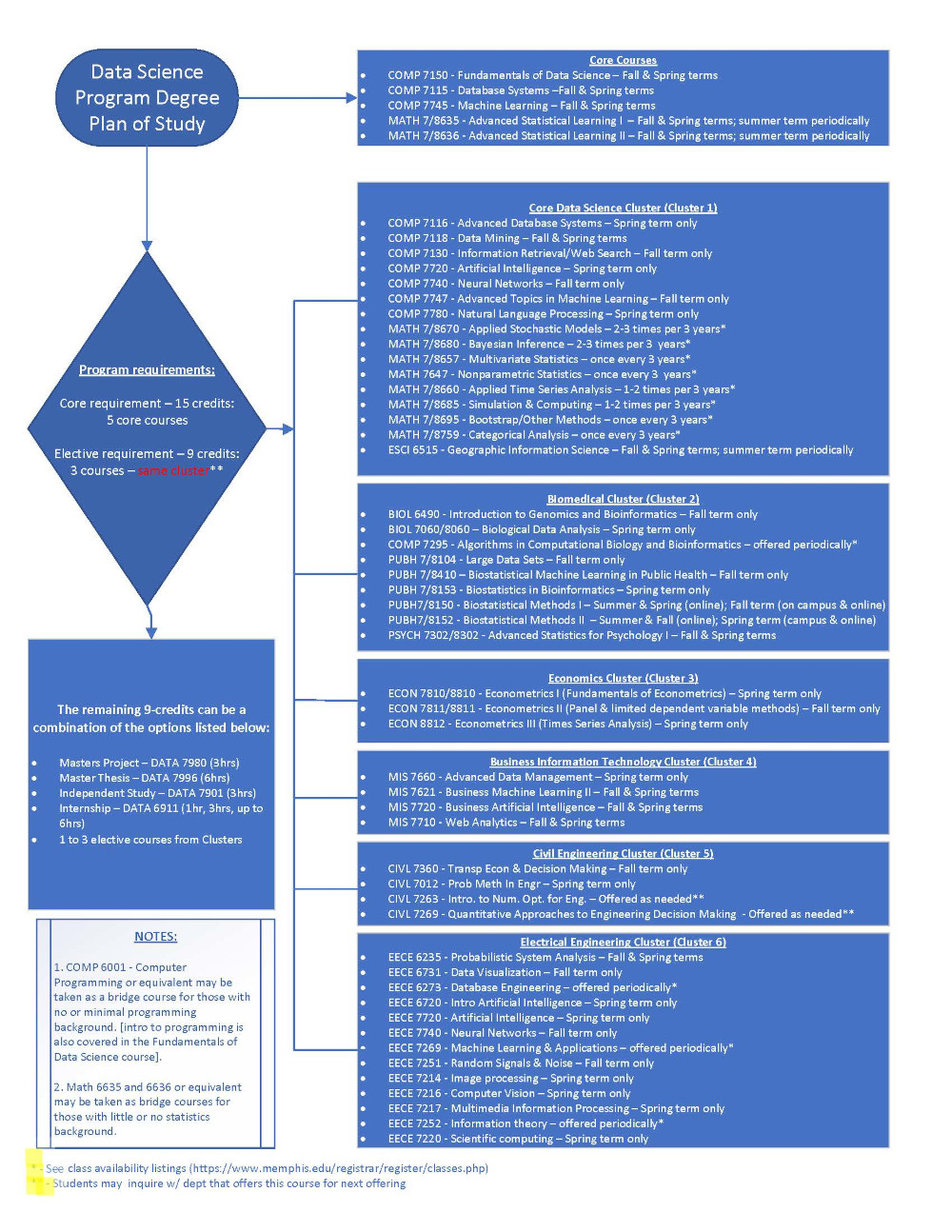Academic Program Requirements
The Master of Science degree in Data Science requires completion of 33 semester credit hours, with 27 hours being 7000 level courses or higher. The program requirements are as follows: 15 credits from the core courses (see below), 15 credits from the list of electives (with a mandatory requirement that 9 credits are from the same cluster - see below), and 3 credits for a Master's project. **UPDATE** As of Fall 2024, the Master’s project is no longer a requirement and may be fulfilled by an elective course option from one of the 6 clusters from the Data Science plan of study.
A Master's Thesis option (6 credits) is also available in which case only 12 credits are needed from the list of electives. Alternatively, students may opt for a Capstone Project course (3 credits) as a way to meet the comprehensive examination requirement of the Graduate School for students who do not write a thesis. Students may choose an Independent Study (3 credits) if they opt for a Master's project or the Capstone Project course, in which case only 12 credits are needed from the list of electives. You may only use up to 6 hours of internship, project, thesis, or independent study towards your degree.
Graduate students must maintain a minimum of a 3.0 GPA (“B”). Grades of “D” and “F” will not apply toward any graduate degree, but will be computed in the GPA. No more than 6 hours of “C-,” “C” or “C+” will be counted and applied towards meeting degree requirements.
To learn more about the minimum graduate degree requirements, visit the link below:
https://catalog.memphis.edu/content.php?catoid=27&navoid=1557
Suggested Plan of Study
Core Courses
COMP 7/8150 - Fundamentals of Data Science (Computational aspects of Data Science)
COMP 7115 - Database Systems
COMP 7/8745 - Machine Learning
MATH 7/8635 - Advanced Statistical Learning I
MATH 7/8636 - Advanced Statistical Learning II
NOTES:
1. COMP 6001 - Computer Programming or equivalent may be taken as a bridge course
for those with no or minimal programming background. [intro to programming is also
covered in the Fundamentals of Data Science course].
2. Math 6635 and 6636 or equivalent may be taken as bridge courses for those with
little or no statistics background.
List of Electives (students are encouraged to pick at least 3 electives from a cluster or concentration area)
Core Data Science Cluster (Cluster 1)
COMP 7/8116 - Advanced Database Systems
COMP 7/8118 - Data Mining
COMP 7/8130 - Information Retrieval/Web Search
COMP 7720 - Artificial Intelligence
COMP 7/8740 - Neural Networks
COMP 7/8747 - Advanced Topics in Machine Learning
COMP 7/8780 - Natural Language Processing
MATH 7/8670 - Applied Stochastic Models
MATH 7/8680 - Bayesian Inference
MATH 7/8657 - Multivariate Statistics
MATH 7647 - Nonparametric Statistics
MATH 7/8660 - Applied Time Series Analysis
MATH 7/8685 - Simulation & Computing
MATH 7/8695 - Bootstrap/Other Methods
MATH 7/8759 - Categorical Analysis
ESCI 6515 - Geographic Information Science
Biomedical Cluster (Cluster 2)
BIOL 6490 - Introduction to Genomics and Bioinformatics
BIOL 7/8060 -
COMP 7/8295 - Algorithms in Computational Biology and Bioinformatics
PUBH 7/8104 - Large Data Sets
PUBH 7/8205 - Special Topics, Mining Data
PUBH 7/8153 - Biostatistics in Bioinformatics
PUBH7/8150 - Biostatistical Methods I
PUBH7/8152 - Biostatistical Methods II
PSYCH 7302/8302 - Advanced Statistics for Psychology I
Economics Cluster (Cluster 3)
ECON 7810/8810 - Econometrics I (Fundamentals of Econometrics)
ECON 7811/8811 - Econometrics II (Panel and limited dependent variable methods, inter
alia)
ECON 8812 - Econometrics III (Times Series Analysis)
Business Information Technology Cluster (Cluster 4)
MIS 7660 - Advanced Data Management
MIS 7621 - Business Machine Learning II
MIS 7720 - Business Artificial Intelligence
MIS 7710 - Web Analytics
Civil Engineering Cluster (Cluster 5)
CIVL 7360 - Transp Econ & Decision Making
CIVL 7012 - Prob Meth In Engr
CIVL 7263 - Intro. to Num. Opt. for Eng.
CIVL 7269 - Quantitative Approaches to Engineering Decision Making
Electrical Engineering Cluster (Cluster 6)
EECE 6235 - Probabilistic System Analysis
EECE 6731 - Data Visualization
EECE 6273 - Database Engineering
EECE 6720 - Intro Artificial Intelligence
EECE 7720 - Artificial Intelligence
EECE 7740 - Neural Networks
EECE 7269 - Machine Learning & Applications
EECE 7251 - Random Signals & Noise
EECE 7214 - Image processing
EECE 7216 - Computer Vision
EECE 7217 - Multimedia Information Processing
EECE 7252 - Information theory
EECE 7220 - Scientific computing

